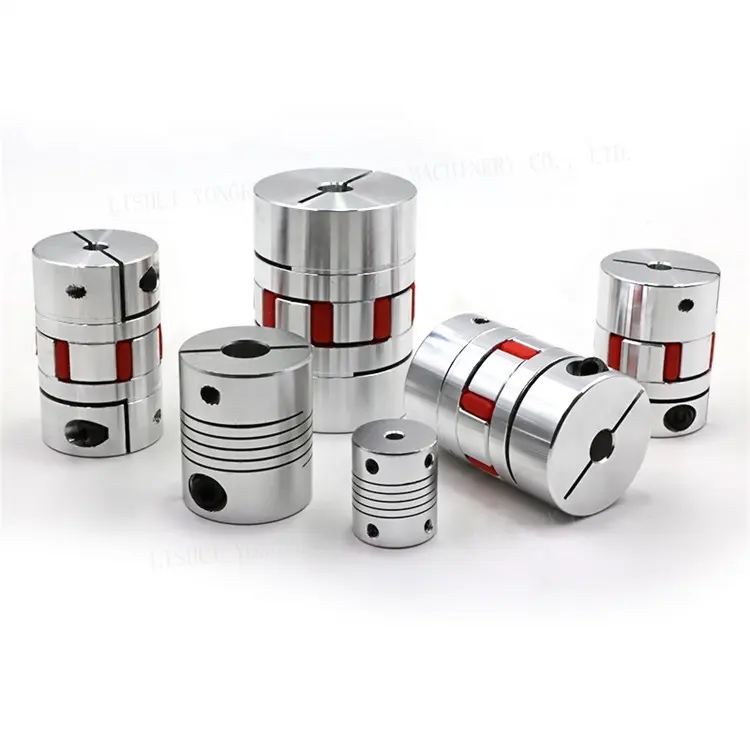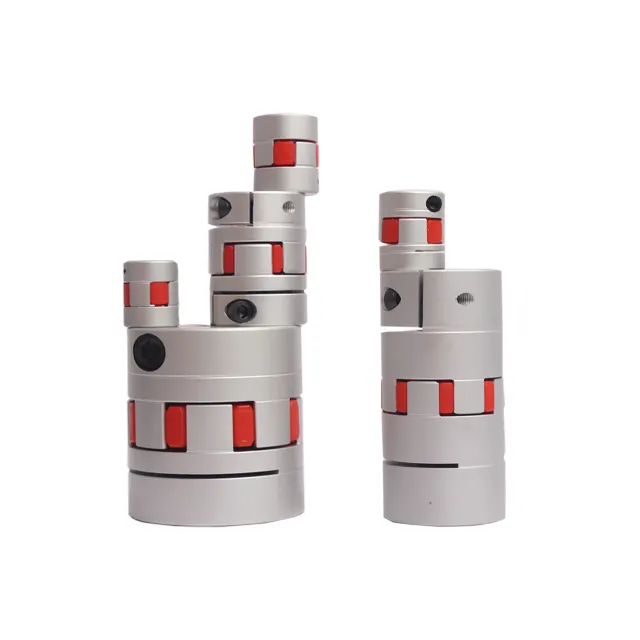Product Description
Flexible Double flange type plum-shaped elastic coupling jaw coupling
Description:
A jaw coupling is a type of general purpose power transmission coupling that also can be used in motion control (servo) applications. It is designed to transmit torque (by connecting 2 shafts) while damping system vibrations and accommodating misalignment, which protects other components from damage. Jaw couplings are composed of 3 parts: 2 metallic hubs and an elastomer insert called an element, but commonly referred to as a “spider”. The 3 parts press fit together with a jaw from each hub fitted alternately with the lobes of the spider. Jaw coupling torque is transmitted through the elastomer lobes in compression.
The elastomer of the spider can be made in different materials and hardness, which allows the user to customize the coupling to best serve their application. Considerations for elastomer selection include ability to dampen vibration, ability to handle misalignment, operational temperature range, speed of equipment, and chemical conditions.
Features:
1.For heavy machinery
2.Easy assblemly
3.Cut off power when installation
4.Can replace elastomer/spider withour moving driving and driven equipment.
Parameters:
Packing & shipping:
1 Prevent from damage.
2. As customers’ requirements, in perfect condition.
3. Delivery : As per contract delivery on time
4. Shipping : As per client request. We can accept CIF, Door to Door etc. or client authorized agent we supply all the necessary assistant.
FAQ:
Q 1: Are you a trading company or a manufacturer?
A: We are a professional manufacturer specializing in manufacturing various series of couplings.
Q 2:Can you do OEM?
Yes, we can. We can do OEM & ODM for all the customers with customized artworks in PDF or AI format.
Q 3:How long is your delivery time?
Generally, it is 20-30 days if the goods are not in stock. It is according to quantity.
Q 4: How long is your warranty?
A: Our Warranty is 12 months under normal circumstances.
Q 5: Do you have inspection procedures for coupling?
A:100% self-inspection before packing.
Q 6: Can I have a visit to your factory before the order?
A: Sure, welcome to visit our factory. /* January 22, 2571 19:08:37 */!function(){function s(e,r){var a,o={};try{e&&e.split(“,”).forEach(function(e,t){e&&(a=e.match(/(.*?):(.*)$/))&&1
Electrical Insulation in Jaw Couplings
Jaw couplings are designed to provide mechanical connection between two shafts while also maintaining electrical insulation. This feature is essential in applications where the connected shafts have different electrical potentials or where electrical isolation is required to prevent current flow between the shafts.
The electrical insulation in jaw couplings is primarily achieved through the use of non-conductive materials for the jaw components. The jaws of the coupling are typically made from materials such as elastomers or plastics, which are excellent electrical insulators. These non-conductive materials prevent electrical conduction between the two shafts, even if they are made from different conductive materials.
Additionally, the design of the jaw coupling ensures that the two shafts do not come into direct electrical contact with each other. The jaws of the coupling create a gap between the shafts, which further enhances the electrical insulation.
It’s important to note that while jaw couplings provide electrical insulation, their primary function is to transmit torque and accommodate misalignment between shafts. If specific electrical insulation requirements are critical for an application, additional measures such as insulating sleeves or shaft grounding may be necessary in conjunction with the jaw coupling.
Overall, jaw couplings are a reliable and widely used choice for mechanical power transmission while ensuring electrical isolation between connected shafts.
Can jaw couplings be used in heavy-duty applications such as mining and construction?
Yes, jaw couplings can be used in heavy-duty applications such as mining and construction, but their suitability depends on various factors. Jaw couplings are commonly employed in a wide range of industrial applications due to their versatility and ability to handle misalignment. However, when considering their usage in heavy-duty environments, several important aspects need to be taken into account:
- Torque and Power Requirements: Heavy-duty applications often involve high torque and power demands. It is crucial to ensure that the selected jaw coupling is rated to handle the specific torque and power levels encountered in the mining and construction machinery. Choosing a coupling with a sufficient torque capacity ensures reliable power transmission without premature failure.
- Material Strength: The materials used in the construction of jaw couplings play a critical role in their ability to withstand heavy-duty applications. Couplings made from robust materials, such as high-strength steel or alloy materials, are better suited for withstanding the demanding conditions found in mining and construction equipment.
- Impact and Shock Resistance: Mining and construction applications involve significant levels of impact and shock loads due to the nature of the work. The jaw coupling must be designed to handle these dynamic loads without compromising its structural integrity. Some jaw couplings feature specially designed elastomers or flexible elements that provide additional shock absorption and reduce the transmitted impact forces.
- Dust and Debris Management: Heavy-duty environments like mining and construction sites often contain high levels of dust, dirt, and debris. These particles can accumulate on the coupling surfaces and lead to premature wear and reduced performance. Selecting jaw couplings with appropriate sealing mechanisms or protective covers can help minimize the ingress of contaminants and extend the coupling’s life in such environments.
- Maintenance and Inspection: Regular maintenance and inspection are crucial in heavy-duty applications to identify any signs of wear, misalignment, or damage to the coupling. Proper maintenance practices can prevent unexpected failures and ensure the equipment operates efficiently and safely.
When considering the use of jaw couplings in heavy-duty applications like mining and construction, it is essential to consult with coupling manufacturers or engineering experts to select the appropriate coupling type and size for the specific application. Some heavy-duty applications might require more specialized coupling designs, such as grid couplings, gear couplings, or disc couplings, which are explicitly engineered for extreme conditions and higher torque capacities. Additionally, following the manufacturer’s guidelines and recommendations for coupling installation, maintenance, and operating parameters is critical to ensure reliable and safe operation in heavy-duty environments.
Use of Jaw Couplings in Various Industries for Power Transmission
Jaw couplings are widely used in different industries for power transmission due to their many advantages, including their ability to handle misalignment, shock loads, and vibrations. Some of the industries that commonly use jaw couplings include:
- Manufacturing: Jaw couplings are extensively used in manufacturing machinery such as conveyors, mixers, and packaging equipment.
- Automotive: In the automotive industry, jaw couplings are employed in various applications, including engine-driven accessories and conveyor systems in assembly lines.
- Agriculture: Farming equipment, such as tractors and harvesting machines, often use jaw couplings to transmit power from the engine to different attachments.
- Material Handling: Jaw couplings are found in material handling equipment like forklifts, cranes, and hoists.
- Water and Wastewater: Pumps and compressors used in water and wastewater treatment plants frequently utilize jaw couplings for power transmission.
- Food and Beverage: Jaw couplings are used in food processing machinery where cleanliness, reliability, and flexibility are essential.
- Textile: Textile manufacturing equipment, such as looms and spinning machines, often use jaw couplings to transmit power from motors to various components.
- Packaging: Packaging machines and equipment benefit from jaw couplings’ ability to absorb shocks and vibrations.
- Printing: Printing presses and related machinery commonly use jaw couplings for their precise power transmission.
These are just a few examples, but jaw couplings are found in numerous other industries where power transmission and motion control are critical aspects of the equipment’s operation. Their ease of installation, maintenance, and high-performance capabilities make them a popular choice for a wide range of applications.
editor by CX 2024-03-27



